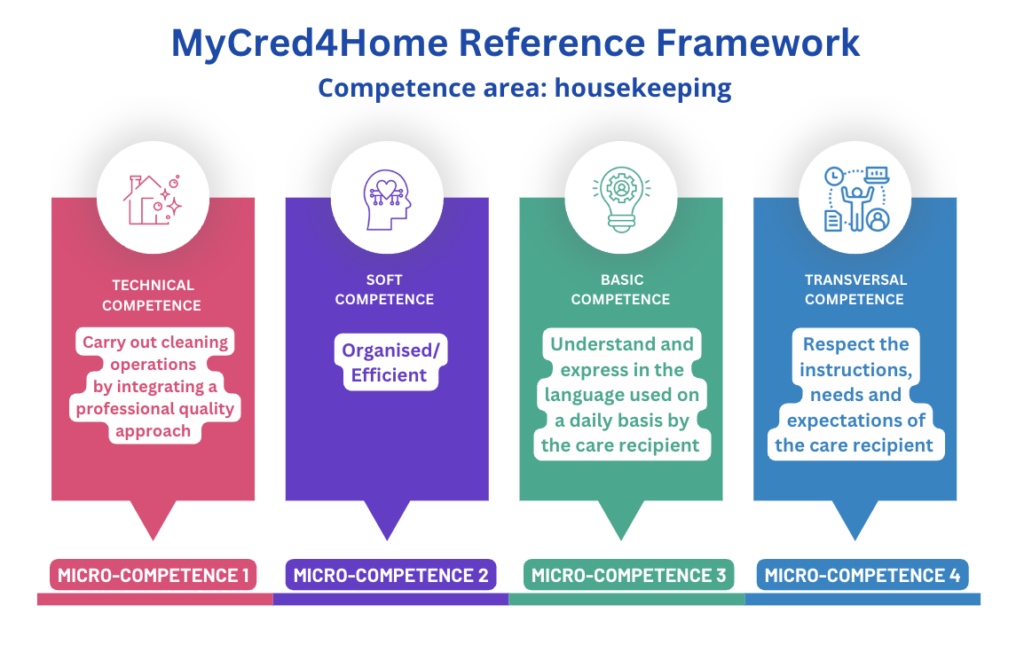Micro-credential standards
Following the conclusions of Project Result 1, the Micro-credentials standards have defined the basic, hard, soft and transversal key competences for the PHS sector to be recognised by micro-credentials via validation of non-formal and informal learning. These skills are defined in accordance with the EQF methodology and the learning outcomes approach, this is to say, in terms of knowledge, skills, responsibility and autonomy, in order to facilitate its transferability and reusability to other sectors and professional profiles.
In the first phase of the project, the partners delimited the scope of the micro-credentials, regarding 4 aspects (these are described in the report):
- Micro-certifications linked to the PHS sector : for the partners in the MyCred4Home project, the aim is to create a system of micro-certifications for professionals already working in the homecare sector, or future professionals.
- Micro-certifications common to several professions : the micro-certification will concern all professions related to the personal and household service sector, and will not be limited to a single profession, as this sector covers a wide range of professions in partner countries (and in Europe). The partners wanted to create a system of micro-certifications across the various professions in the PHS sector.
- Micro-certifications specifically linked to housekeeping competence area : in this context, the micro-certification will relate exclusively to activities linked to housekeeping, and more particularly to surface cleaning operations. Laundry care will not be covered by the micro-certification created by the partners.
- Micro-micro certifications for people in difficulty in Europe: jobseekers who have never worked in the homecare sector, people undergoing vocational retraining, people experiencing social difficulties, migrants, etc.
Background information:
Personal and household services (PHS) cover jobs and services carried out to support households:
- 63% are care activities: childcare, assistance to the elderly, dependent or disabled, excluding healthcare.
- 37% are non-care activities: cleaning, laundry, meal preparation, gardening, small house repairs and private lessons
This represents 9.5 million jobs in the EU, or 4% of EU employment. Source : European Commission https://ec.europa.eu/social/main.jsp?catId=1427&langId=en
Micro-certification is a priority of the European Commission’s Skills Strategy, which aims to help individuals and companies develop more and better skills. In this framework, the MyCred4Home project aims to conduct an experiment to test micro-certification adapted to the personal and household service sector.
What did the process look like in the Mycred4Home project? To establish the methodology and tools around microcertification for the PHS sector, project Partners collected data and feedback from several types of main stakeholders: future users of microcertification, people who work or would like to work in the PHS sector; employment and training professionals; certification stakeholders in the public or private sector.
The objective of this phase was to collect information concerning the type of competence area to be micro-certified, their format, the evaluation and validation methods of the micro-certification. This step allowed us to build a coherent and relevant micro-certification framework proposal, adapted to a need. Please find below the graphic visualisation of the framework developed by MyCred4Home partnership. Project Coordinator: Iperia was in charge of the final results.

As far as possible, as this is a European project, these tools are standardised. However, it is expected that they will respond to a need in the territories, and given the diversity of contexts in each of the partner countries, potential adaptations are foreseen.
What is going to happen next? Once the tools have been designed, a real-life test will be conducted by the project partners, before the elaboration of recommendations for the use of micro-certification in the PHS sector.